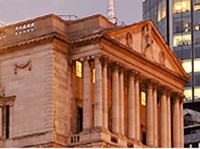BoE injects £75-bn through further quantitative easing
08 Oct 2011
Worried over the continuing slowdown in the British economy, the Bank of England (BoE) has decided to inject £75 billion through quantitative easing (QE), besides maintaining interest rates at a record low of 0.5 per cent.
 ''The Bank of England's Monetary Policy Committee (MPC) voted to maintain the official bank rate paid on commercial bank reserves at 0.5 per cent,'' said the BoE in a statement. ''The committee also voted to increase the size of its asset purchase programme, financed by the issuance of central bank reserves, by £75 billion to a total of £275 billion.''
''The Bank of England's Monetary Policy Committee (MPC) voted to maintain the official bank rate paid on commercial bank reserves at 0.5 per cent,'' said the BoE in a statement. ''The committee also voted to increase the size of its asset purchase programme, financed by the issuance of central bank reserves, by £75 billion to a total of £275 billion.''
The UK's central bank has already pumped in £200 billion into the economy by buying assets including government bonds, in a bid to boost lending by commercial banks. However, this is the first time it has added to its QE programme since 2009.
The BoE's moves came a day after data indicated the economy remained stagnant over the past three quarters and that the 2008-09 recession was worse than previously thought. ''The pace of global expansion has slackened, especially in the UK's main export markets,'' said the BoE. ''Vulnerabilities associated with the indebtedness of some euro-area sovereigns and banks have resulted in severe strains in bank funding markets and financial markets more generally. These tensions in the world economy threaten the UK recovery.''
Key interest rates in the UK have been kept at a low of 0.5 per cent since March 2009, when the central bank began pumping cash into the economy under its QE policy. The first phase of the policy saw the BoE inject £200 billion into the economy between March 2009 and January 2010. Following the additional injection of £75 billion, the pound hit a 14-month low against the US dollar.
The BoE's decision to hold interest rates has been widely expected. The European Central Bank also held its key interest rates at 1.5 per cent. Inflation in the UK is currently at 4.5 per cent, way above the BoE's target of two per cent.
Britain's gross domestic product (GDP) expanded by a mere 0.1 per cent in the April-June quarter.
''In the United Kingdom, the path of output has been affected by a number of temporary factors, but the available indicators suggest that the underlying rate of growth has also moderated,'' said the BoE. ''The deterioration in the outlook has made it more likely that inflation will undershoot the two per cent target in the medium term. In the light of that shift in the balance of risks, and in order to keep inflation on track to meet the target over the medium term, the committee judged that it was necessary to inject further monetary stimulus into the economy.''



















